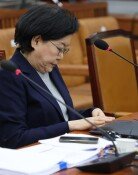Irresponsible pension reform makes everyone a loser
Irresponsible pension reform makes everyone a loser
Posted May. 07, 2024 07:38,
Updated May. 07, 2024 07:38
The civil servants' pension, coveted by pension subscribers, has been running a deficit since 1993 despite boasting double the national pension's insurance premium rate (18%). Each year, the government covers this shortfall with taxpayer funds. However, projections indicate that next year will require the largest injection ever, estimated at around 10 trillion won. This surge is attributed to the growing number of retired civil servants receiving pensions, reaching 690,000. Thus, the civil servants' pension, sustained by taxpayers' money, foreshadows the 'anticipated future' of the national pension, which is slated to fall into deficit 16 years later.
National pension policyholders pay about 17 times more than civil servants' pension contributors, while recipients receive over 10 times more. Even with hundreds of trillions of won poured into the colossal national pension, bankruptcy looms as a real threat. This burden is unsustainable for future generations. Despite the impending 'pension dystopia,' the national pension insurance premium rate has remained fixed at 9% since 1998, a consequence of government and political procrastination in enacting reforms. Meanwhile, efforts are focused solely on increasing the basic pension, which is funded by taxpayers.
Even the 21st National Assembly Pension Reform Special Committee (Pension Special Committee), the main pillar of reform, extended its deadline twice and then, with less than a month left in its term, absurdly allowed for discussions in Europe. Are the government and political sphere aiming for a 'numerical reform,' politically compromising only on parameters such as insurance premium rates and income replacement rates without even reaching an agreement on the direction of pension reform, whether to focus on income stabilization or fiscal stability?
Kim Sang-gyun, chairman of the public opinion committee of the National Assembly's Pension Special Committee, recently released the results of a survey by a citizen representative group that chose a 'pay more, receive more' type of national pension reform plan, saying, "Now is the time for the National Assembly." It is a call to the National Assembly to come up with a pension reform plan that can harmonize income security and fiscal stability, taking into account the direction derived from the public discourse process.
However, for proper reform to take place, there must be political consensus on the direction of reform. By skipping this step and suddenly presenting citizens, who are stakeholders, with a choice between 'income security' and 'fiscal stability,' generational distrust and conflict have escalated. Future generations rebel, asking, "Why should we pay more and receive less?" while the older generations protest, "If we pay more, shouldn't we receive more?" When the instinct of 'loss aversion' kicks in, people end up making choices where everyone becomes a loser.
For a challenging reform with many stakeholders to succeed, there must be a belief that everyone can be a winner. We are in a 'compound crisis' situation where we cannot sacrifice future generations and pension finances to ensure retirement income, nor can we ignore the highest level of elderly poverty in the OECD due to fiscal constraints. If the political sphere had presented a 'third way' to overcome the dilemma of income security and fiscal stability by offering rational implementation plans to experts on how much more to pay and how much more to receive to ensure sustainability, the choice for the people would have been much easier. There would have been no need to worry about the individual's loss within the framework set by the political sphere, such as 'income security' and 'fiscal stability.'
With a growing sense of empathy for reform, we will find the courage to tackle challenging tasks such as extending contribution periods and retirement ages and adjusting the roles of basic pensions and national pensions to prevent burdening future generations, as seen in Sweden. Introducing automatic adjustment mechanisms to revise pension amounts, similar to those in Japan, will also become feasible. Only then can we broaden the spectrum of reform options regarding how much more to contribute and receive.
By 2040, all four major pensions, including the national pension, civil servants' pension, private school pensions, and military pensions, are projected to face deficits. At that juncture, everyone will genuinely suffer the consequences.







